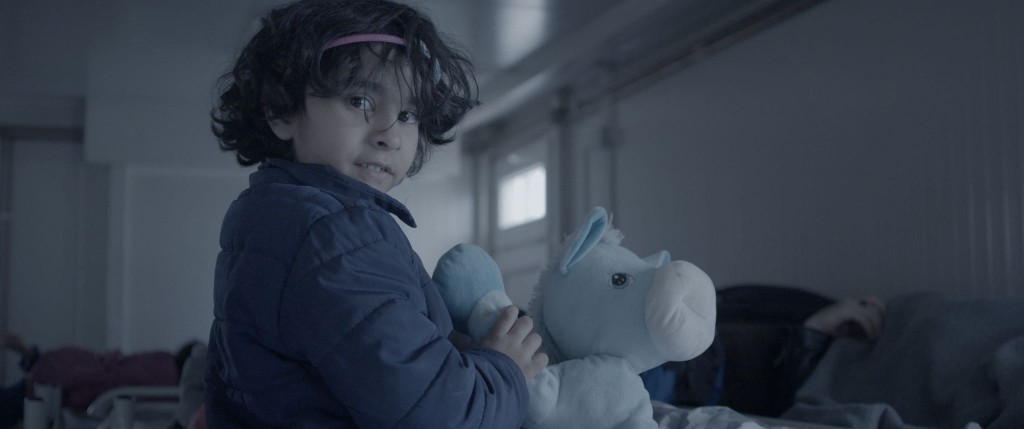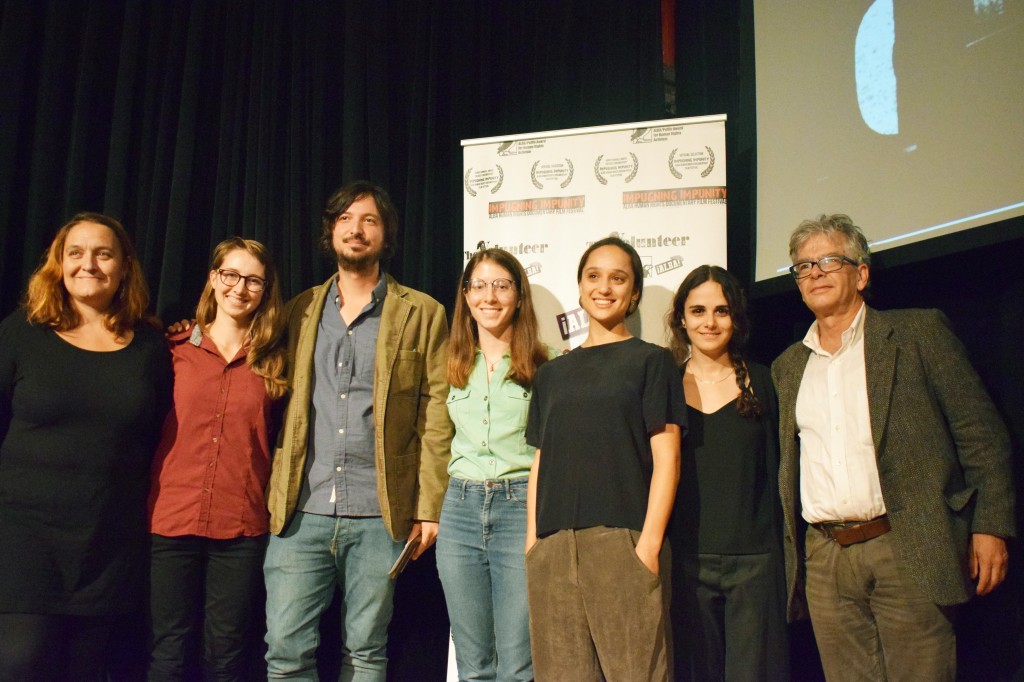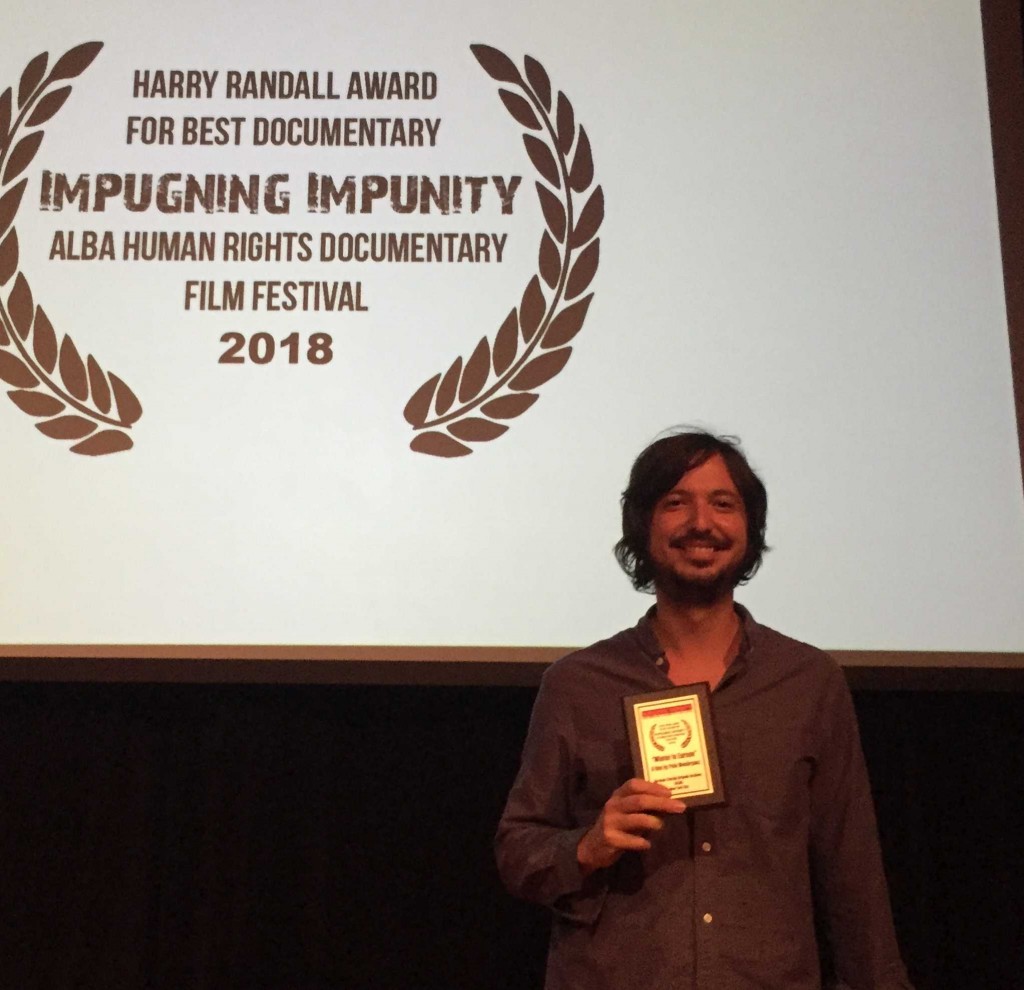ALBA’s Human Rights Film Festival Draws Submissions from over 40 Countries
ALBA’s seventh annual human rights documentary film festival, Impugning Impunity, drew over 130 submissions from 41 countries. The films focused on topics ranging from historical memory and anti-fascist women to indigenous rights and environment, systemic poverty, and migration. In three days, more than 500 spectators saw 24 films. Two documentaries won the Harry Randall Award.
Upholding the values of the US volunteers who fought fascism in the Spanish Civil War, the 2018 festival brought some of the best current Spanish political documentaries on the Civil War (The Silence of Others, Milicianas, Spain in Two Trenches, and several others) as well as Puerto Rico’s struggle for independence (1950: the Nationalist Uprising), experimental animation questioning capital punishment (Loser By Birth) and the poetics of space and intergenerational trauma (Halabja).
Over the course of three days, the audience was able to speak directly with the filmmakers, protagonists, and activists who attended the screenings. This interaction, together with the information revealed in the films, allows the audience to convert the information and emotions provoked by the films into a commitment to activism. The public, in other words, becomes a crucial social actor.
While some of the documentaries dealt with historical events, it was clear that the legacies of the past continue to shape the present, much like a stone thrown into a still lake generates waves. For instance, the effects of what happened during the Spanish Civil War persist to this day—for example, in the quest for justice on behalf of the victims of Francoist repression.
This year’s program played special attention to displacement. In Exile: A Family Film by Juan Francisco Urrusti (Mexico, 2017) tells the story of a Spanish family that finds itself in Mexico as a result of Civil War. The director of the film, son and grandson of Spanish Republican exiles, masterfully narrates his personal history as it intertwines with those of Spain and Mexico. In Transit by Mariam El Marakeshy (Turkey, 2018), young refugees risk their lives crossing the Aegean Sea to Europe, only to be trapped on the Greek island of Lesbos, with no future and closed borders. Land of Doom by Milad Amin and Ghaith Beram (Syria, 2018), screened in its U.S. premiere, is an intimate and personal recording of civilians’ suffering during the siege of Aleppo.
Winter In Europe (Spain, 2018)—also screened in the U.S. for the first time, and winner of the festival’s best feature—is set behind an old train station in Belgrade, Serbia. There, hundreds of Afghan refugees live through the cold, near toxic fires, and apocalyptic landscapes, waiting to cross the Hungarian border. Monumento by Laura Gabbert (USA, 2017) shows a unique meeting point along the US-Mexico border where family members from both countries can see and speak to one another—but cannot touch each other.
What would you pack? by Sara Gozalo (USA, 2017), produced by the new Sanctuary Coalition, zeroes in on the 25-pound suitcase that Immigration and Customs Enforcement (ICE) allows deportees to carry with them. As family members drop off these suitcases, they cannot see their loved one to say goodbye.
Through the drawings and interviews of George Butler, 2,300 Miles To Work (USA, 2018), the winner of the festival award for best short, tells the story of a young economic migrant from Tajikistan travelling to Russia in search of a job. In Franklin Lopez’s A Tale of Two Borders (Canada, 2016), the Anarchist media collective subMedia interviews a number of individuals from the United States and Canada who are helping to chart a course for the future based on solidarity, mutual aid, and open borders.
Other films revealed that war and conflict often affect the body and mind in different ways. The short experimental film Acting Erratically by Tuff Guts (USA, 2018) uses examples of physics phenomena—static, waves, vacuum—to exemplify the relationship that women and gender-non-conforming people of color establish with a system that mentally violates them. They are bombarded with contradictory expectations that, if not fulfilled, result in disqualification of their faculties, as occurred in diagnoses of hysteria. Along similar lines, the short Loser by Birth, by student Cole Bankston (USA, 2017), brilliantly uses stop-motion, ink, and watercolor on toilet paper to animate the life story of an inmate who was sentenced to death. Books Are My Weapon, by Alice Obar (USA, 2017), tells the story of a librarian in Brooklyn who started a homelessness outreach program. In Julie Mallozzi’s Circle Up (USA, 2017), a mother reaches out to the murderer of her teenage son to offer a chance at forgiveness.
Closing the festival were two films with a deeply personal and feminist outlook. Djamilia (France, 2018), shot in super-8 by the French director Aminatou Echard, braids mythology, tradition and poetic denunciation through a literary heroine in Kyrgyzstan. The spectacular Halabja, 1988 (USA, 2018), by director Faride Sakhaei, is an embodied performance of trauma choreographed by the director and Isabel Umali.
Winners of the Harry Randall Award were Tom Brown’s 2,300 Miles to Work (best documentary short) and Winter in Europe, by Polo Menárguez (best documentary feature). The jury was composed of Kathy Brew, noted documentarian and veteran programmer currently serving as the Guest Curator for MoMA’s Doc Fortnight; Paco de Onís, Executive Director of Skylight, a media company dedicated to advancing social justice through storytelling; and Matt Porwoll, an Emmy-award-winning cinematographer based in New York.
Attending speakers included filmmakers Tània Balló, Almudena Carracedo, Sara Gozalo, Polo Menárguez, Alice Obar, Farideh Sakheifar, Mollly Stuart, Juan Francisco Urrusti, Professors Josephine Labanyi, Juana Suarez, María H. Ojeda, ICP’s curator Cynthia Young, choreographer Isabel Umali, activists Ravi Ragbir from the New Sanctuary Coalition, Paul Harris from Black Youth Project, and Donald Peebles.
Special thanks to our sponsors: Downtown Community Television Center, the Center for Constitutional Rights, Puffin Foundation, King Juan Carlos I of Spain Center, La Nacional, Estrella Galicia, Natural Merchants, and Manhattan Edit Workshop.
Credits: Marina Garde, director and producer; Ruth Somalo, associate director and programmer;
Alec Lane, screening committee; Patrick C. Offenheiser, screening committee; Jacqueline N. Manuel, outreach coordinator; Adam Maida, graphic designer; Max Resnik, projectionist.
Born in Bolivia, Natalia Chávez Gomes da Silva is pursuing an MFA in Creative Writing in Spanish at New York University. Her short-story collection Humedad won the National Award of the Santa Cruz de la Sierra Municipal Government in 2010.

















